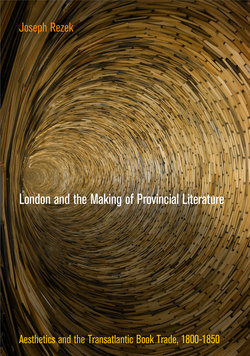London and the Making of Provincial Literature

Реклама. ООО «ЛитРес», ИНН: 7719571260.
Оглавление
Joseph Rezek. London and the Making of Provincial Literature
Отрывок из книги
London and the Making of Provincial Literature
Series Editors
.....
The same Enlightenment thinkers invested in resemblance, however, also provided philosophical ground for the cross-cultural literary transaction. In “Of the Standard of Taste,” Hume articulated the values of the unbiased critic, who “must preserve his mind free from all prejudice.” “When any work is addressed to the public,” Hume writes, “though I should have a friendship or enmity with the author, I must depart from this situation; and considering myself as a man in general, forget, if possible, my individual being and my personal circumstances.”64 Through transcending the contingences of the “personal,” Humean disinterest grants universality to the observer (“man in general”); this locates value not in representation but in the integrity of judgment.65 Adam Smith’s Theory of Moral Sentiments (1759) provided a model of sympathy that complemented the selflessness of Hume’s ideal critic. Smith’s model, almost immediately absorbed as a theory of literature, not only encouraged the spectator or reader to forget his or her own personal interests through identifying with the other but endowed such identification with the highest moral value. “And hence it is,” Smith writes, “that to feel much for others and little for ourselves, that to restrain our selfish, and to indulge our benevolent affections, constitutes the perfection of human nature.”66 Provincial authors appealed to the “benevolent affections” of metropolitan readers in heavily aestheticized Smithian gestures. These appeals shaped the kind of cross-cultural communion they imagined could overcome distance and national difference.67
Cross-cultural communion occurred in the very limited sphere of the literary. As John Guillory and Clifford Siskin have argued, by the Romantic period, the category of “literature” had disaggregated from other realms of culture.68 The aesthetics of provinciality helped define the terms of this disaggregation by claiming for literature its own values and rules. Provincial authors banished politics and prejudice to promote literary exchange as a peaceful elite activity—what Siskin calls the “pleasurable familiarity of Literature.”69 That activity mingled Enlightenment ideals of disinterest and sympathy with a more quintessentially Romantic ideology that insists products of the imagination exist entirely for their own sakes. Literary exchange was imagined to be isolated, protected, and supervised according to rules only specialized practitioners could determine and fulfill. “Exchange” was, indeed, paramount, given the importance of cross-cultural communion, and its necessity marks an obvious difference between the aesthetics of provinciality and a Kantian or Coleridgean notion of aesthetic form as organic or nonpurposive. But even Kant, in the Critique of Judgment (1790), grants aesthetic pleasure a purpose once it is joined with the idea of communication. Regarding “the judgment of taste,” Kant writes that “it does not follow that after it has been given as a pure aesthetic judgment no interest can be combined with it.”70 The highest form of interest that can be added to such a judgment is appreciation of its “universal communicability,” which “almost infinitely increases its value” through demonstrating an “inclination to society.”71 The value of a judgment’s universal communicability—tied to Kant’s “common sense”—gives a social function to aesthetics that admits into its compass relations among persons. “In the sphere of aesthetic culture,” Terry Eagleton writes, with regard to the Kantian imaginary, “we can experience our shared humanity.”72 Kant never describes pure aesthetic judgment as anything other than a priori determined, but the added indirect value of universal communicability provides a powerful model for a literary sphere defined through its own ideals.
.....